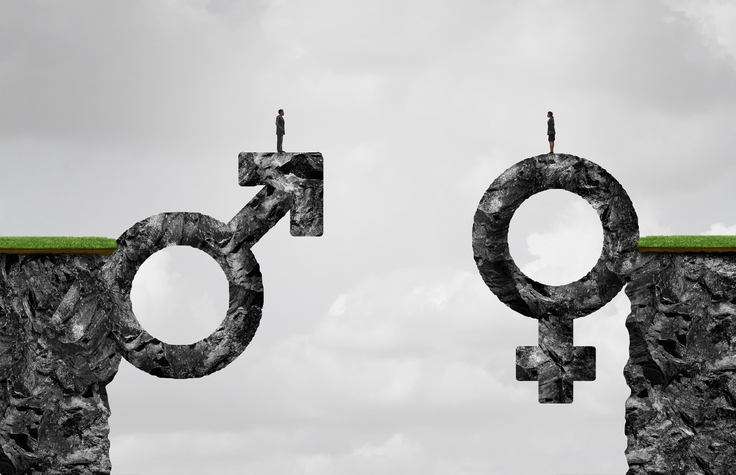“The Bible is much more concerned that we be godly, not stereotypically masculine or feminine. While our culture reinforces narrow stereotypes of masculinity and femininity, the Bible doesn’t give us narrow mandates for how all men and women must behave. We are all called to be virtuous. While the Bible celebrates our sex differences as male and female, it gives us tremendous freedom in how we live within our sexed bodies.” Preston Sprinkle, Embodied pg. 84
What carries weight in our identity? Is it our biology—that which would include our XX or XY chromosomes, internal reproductive organs, external sexual genitalia and the development of secondary sexual characteristics at puberty? Or does our gender identity carry more weight? This would be more of the “internal sense” of who we are as either masculine or feminine. Do I feel more male, female, neither or both? The emphasis being on the word feel. In my last blog we explored some of these burning questions.
Sex and gender used to be the same thing back in the day. Synonyms for one another. But in our current culture, a battle is raging. Sex and gender are different things now. So different that an ever-widening canyon is developing with two vehement camps on either side. Some will say biology has nothing to do with gender identity, while others are all about the body and dismiss the feelings surrounding gender. I believe both carry important and similar weight in shaping our identity. So, what happens when either of these two important facets of ourselves is left out?
It All Goes Back to Gender Roles and Stereotypes
I’ve shared in past articles, about having an incongruence with my physical body and gender identity. It’s played a big part in my story. As early as 4 and 5 years old, those around me began to notice how I was drawn to all things feminine. My interests weren’t “rough and tumble” like the other boys. I was more emotional, sensitive and had an artistic bent. Usually I spent time with the girls in my class because boys (and the way they behaved) were a mystery to me. I “felt” more like a girl, rather than a boy.
Now, if anyone had asked me the simple question, “Why do you feel like you’re a girl?”, I imagine the elementary school Scott would have said something like, “I feel like a girl because I don’t like sports. I’d rather draw or play jump rope, hopscotch or four-square. Movies where men and women find each other and fall in love are enjoyable. I always want to play with my cousin’s Easy Bake Oven and Barbie Dream House. I don’t want to wrestle on the ground and get all dirty.”
Hmmm, interesting. Taking my body out of the equation and solely relying on my feelings surrounding masculinity or femininity has left a limiting definition. Let’s look at a few observations. The things mentioned above are playground games, movies, toys and various activities. Do any of these particular interests signal that I should be a girl physically, emotionally and psychologically to enjoy these things? Not really. These activities have nothing to do with what it means to be a male biblically; they are simply a product of marketing (toys being specifically advertised for one gender) or gender stereotypes.
A Regression to the 1950’s?
A similar thing could happen if I took my feelings of gender identity out of the equation and solely looked at my body for definition. Yes, I believe I am male by all the biology previously mentioned—chromosomes, genitalia and secondary sexual characteristics. No doubt about it, I’m a male with every cell down to my bones. But what kind of body? I was always the smallest and slightest boy in class. As I said I was born with a milder temperament. Height, weight, muscle mass, athletic prowess–it still gets down to what is stereotypically a boy/man?
After decades of hard work breaking out of the narrow gender stereotypes of the 1950’s, it’s almost like we’re regressing. We’re using old worn-out stereotypes to define masculinity and femininity—pink, blue, romantic comedies, action movies, long hair, short hair, etc. And that is the question of our current cultural hour, isn’t it? What exactly defines a woman? What is a man?
Freedom in Christ
When I’ve taught on gender in the past, my encouragement to those listening was to “break free” and to “live beyond” the narrow gender roles swirling about in our culture. To live courageously according to your own interests and ways you can uniquely express being a man or woman. I still believe that to be true, but I also realize our culture is riddled with all kinds of gender roles and stereotypes. Some which we can never fully escape and have influence in all sorts of ways we might not even consciously understand.
I am encouraged by Preston’s Sprinkle’s quote above that biblically we find “tremendous freedom in how we live within our sexed bodies.” Some of our most beloved biblical characters somehow managed to keep with traditional expectations of manhood and womanhood and yet somehow live beyond them. Jesus Himself, gives me the most hope about living as a man in the world. Fully masculine, even offering Himself up to death to rescue us, but not the warrior or patriarchal family guy his culture would have expected. Just another reason for me to love and follow Jesus and continually look to Him for how to lead a godly life.

Scott Kingry
Program Director
Although he holds a degree in graphic arts, he attributes his ministry qualifications to the “school of hard knocks.” God’s abundant grace continues to be the instrument of growth in his life, and he desires to be firmly grounded in the forgiveness and freedom of relationship with Jesus Christ.
Scott attends a Presbyterian Church.
Make a Difference in Someone's Life
If you enjoy reading WGA’s blogs and would like to show your support, please consider making a donation. Where Grace Abounds is a 501(c)3 non-profit organization. The majority of services, including support groups and discipleship counseling, are provided free of charge. Your financial gifts help to cover the costs associated with offering a free program to those who seek WGA’s services.

